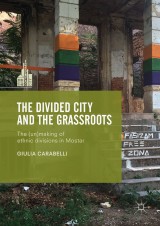Details

The Divided City and the Grassroots
The (Un)making of Ethnic Divisions in MostarThe Contemporary City
|
74,89 € |
|
| Verlag: | Palgrave Macmillan |
| Format: | |
| Veröffentl.: | 14.03.2018 |
| ISBN/EAN: | 9789811077784 |
| Sprache: | englisch |
Dieses eBook enthält ein Wasserzeichen.
Beschreibungen
Focusing on Mostar, a city in Bosnia Herzegovina that became the epitome of ethnic divisions during the Yugoslav wars, this cutting edge book considers processes of violent partitioning in cities. Providing an in-depth understanding of the social, political, and mundane dynamics that keep cities polarized, it examines the potential that moments of inter-ethnic collaboration hold in re-imaging these cities as other than divided. Against the backdrop of normalised practices of ethnic partitioning, the book studies both ‘planned’ and ‘unplanned’ moments of disruption; it looks at how networks of solidarity come into existence regardless of identity politics as well as the role of organised grassroots groups that attempt to create more inclusive; and it critically engages with urban spaces of resistance. Challenging the representation of the city as merely a site of ethnic divisions, the author also explores the complexities arising from living in a city that validates its citizens solelythrough ethnicity. Elaborating on the relationships between space, culture and social change, this book is a key read for scholars, students, and urban practitioners studying ethnically divided cities worldwide. <p></p>
<p>Introduction.- Imagining, Planning and Building Mostar after the War.- The Everyday Life of Mostar.- Grassroots Movements and the Production of (other) Space(s).- Conclusion.</p><p></p>
Giulia Carabelli is a Research Fellow at the Max Planck Institute for the Study of Religious and Ethnic Diversity, Göttingen, Germany. She holds a PhD in Sociology at Queen's University Belfast, a Masters in Research Architecture at Goldsmiths College, London and a BA in History of Islamic Architecture at Ca’Foscari University of Venice. Her research interests lie at the intersection of urban sociology, cultural studies, and political theory. She received the Higginson Leadership Award in 2014. <p></p>
Focusing on Mostar, a city in Bosnia Herzegovina that became the epitome of ethnic divisions during the Yugoslav wars, this cutting edge book considers processes of violent partitioning in cities. Providing an in-depth understanding of the social, political, and mundane dynamics that keep cities polarized, it examines the potential that moments of inter-ethnic collaboration hold in re-imaging these cities as other than divided. Against the backdrop of normalised practices of ethnic partitioning, the book studies both ‘planned’ and ‘unplanned’ moments of disruption; it looks at how networks of solidarity come into existence regardless of identity politics as well as the role of organised grassroots groups that attempt to create more inclusive; and it critically engages with urban spaces of resistance. Challenging the representation of the city as merely a site of ethnic divisions, the author also explores the complexities arising from living in a city that validates its citizens solelythrough ethnicity. Elaborating on the relationships between space, culture and social change, this book is a key read for scholars, students, and urban practitioners studying ethnically divided cities worldwide. <p></p>
Critically discusses the limits of mainstream representations of Mostar as a site of ethnic hatred Examines complexities arising from living in a city that validates its citizens solely through ethnicity Provides a key contribution to the fields of urban conflict studies and the politics of social movements in the context of socio-cultural segregation
Critically discusses the limits of mainstream representations of Mostar as a site of ethnic hatred <p>Examines complexities arising from living in a city that validates its citizens solely through ethnicity </p> <p>Provides a key contribution to the fields of urban conflict studies and the politics of social movements in the context of socio-cultural segregation.</p>
<div><p>“This thought-provoking book shows how resistance can be understood as a spatial practice and how we can conceptualize social change in a polarized city like Mostar. It is an important and timely contribution to the literature on post-war societies, divided cities and, more generally, to current debates in urban studies.” (Dr. Monika Palmberger, research fellow at the Department of Social and Cultural Anthropology, University of Vienna and at the Interculturalism, Migration and Minorities Research Centre, University of Leuven)</p></div><div><br></div>“The Divided City and the Grassroots is a theoretically sophisticated and empirically rich challenge to current understandings of urban divisions. Drawing on ethnographic research in Mostar, Carabelli shows the both the complex plurality of everyday urban life and the potential of grassroots movements to challenge ethnic-nationalist narratives of separateness. The Divided City is an important intervention in debates about divided societies and post conflict cities.” (Dr Martin Coward, Reader in International Politics, The University of Manchester, UK and author of Urbicide: The politics of urban destruction, 2008)<div><br><div><p>“This theoretically sophisticated and ethnographically attuned study is unique in its ability to take seriously ethnic segregation in Mostar, while, at the same time, illuminating multiple discourses and processes that generate supra- and trans-ethnic practices, entanglements, and visions for the future.” (Azra Hromadžić, Associate Professor and O'Hanley Scholar, The Maxwell School of Citizenship and Public Affairs, US and author of Citizens of Empty Nation: Youth and State-Making in Postwar Bosnia and Herzegovina, 2015)</p><br></div></div>
Diese Produkte könnten Sie auch interessieren:

Der Aufstand der Jugendlichen in den Banlieues: Eine Analyse der Pariser Unruhen von 2005

von: Ahmed El- Mamouni

23,00 €















